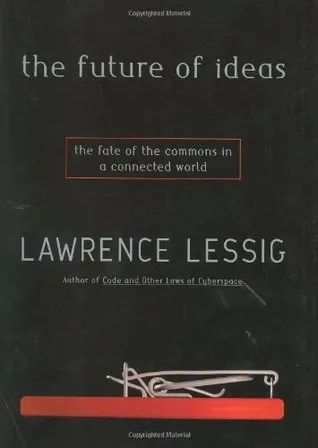The Future of Ideas: The Fate of the Commons in a Connected World

Unlocking the Digital Commons: "The Future of Ideas" by Lawrence Lessig
Introduction
In the digital age, where ideas flow like currents in a vast sea of information, Lawrence Lessig's "The Future of Ideas: The Fate of the Commons in a Connected World" serves as a lighthouse guiding us through the complex waters of creativity, innovation, and digital freedom. Join me as we set sail into the intriguing pages of this enlightening book.
Navigating the Digital Commons
The Commons Unveiled
Lessig invites us to ponder the fate of the commons in a world increasingly dominated by digital spaces. The commons, where ideas are born and shared freely, is at the heart of innovation. As I read, I couldn't help but think of my experiences contributing to online forums where ideas flowed organically, creating a shared space for knowledge and creativity.
My Digital Eureka Moment
One of the book's key concepts is the idea of the "commons" as a space for collaboration and creativity. Lessig's exploration of open-source projects resonated with me, triggering memories of the first time I stumbled upon a collaborative coding project. The sense of a shared intellectual playground was exhilarating.
The Threat to Innovation
Enclosures and the Struggle for Ideas
Lessig doesn't shy away from addressing the threats to the digital commons. The metaphorical "enclosures" of the digital age, where proprietary interests limit the free flow of ideas, are explored with a sense of urgency. Reading this, I couldn't help but reflect on instances where corporate interests stifled the potential for collaborative innovation.
The Garden Wall that Blocked Creativity
A personal anecdote that echoed Lessig's concerns was my experience with a closed-source software project. The limitations imposed by proprietary barriers hindered the community's ability to contribute and collaborate freely. Lessig's words became a rallying cry for the importance of dismantling these metaphorical garden walls.
Balancing Regulation and Freedom
Striking the Right Chord
As we venture deeper into the book, Lessig grapples with the need for a delicate balance between regulation and the freedom to innovate. The tension between protecting intellectual property and fostering creativity is a central theme. I found myself nodding in agreement, recalling instances where the pendulum swung too far in favor of restrictive regulations.
The Dance of Innovation
An insightful metaphor Lessig introduces is the "innovation commons," emphasizing the importance of finding harmony between regulation and freedom. It reminded me of a dance, where the steps are governed by rules but leave room for spontaneity. The dance of innovation, Lessig suggests, thrives in a space where ideas can move freely.
Preserving a Vibrant Digital Future
Citizens as Champions
Lessig calls on us to become stewards of the digital commons, advocating for a more inclusive and open digital future. This resonated deeply with me, prompting a reflection on the role we, as digital citizens, play in shaping the online landscape. My commitment to supporting open-source initiatives and advocating for digital freedom became a personal mission.
A Call to Action
The book is not just an exploration of ideas; it's a call to action. Lessig urges us to be vigilant custodians of the digital commons, safeguarding the spaces where ideas flourish. As I reached the final chapters, I felt a renewed sense of responsibility for the future of our interconnected world.
Conclusion
"The Future of Ideas" isn't just a book; it's a manifesto for the digital age. Lessig's eloquent prose and compelling arguments make this a must-read for anyone passionate about the fate of the digital commons. As we close this chapter, let's embrace our role as guardians of the digital sea, ensuring its waters remain open and free for generations to come.